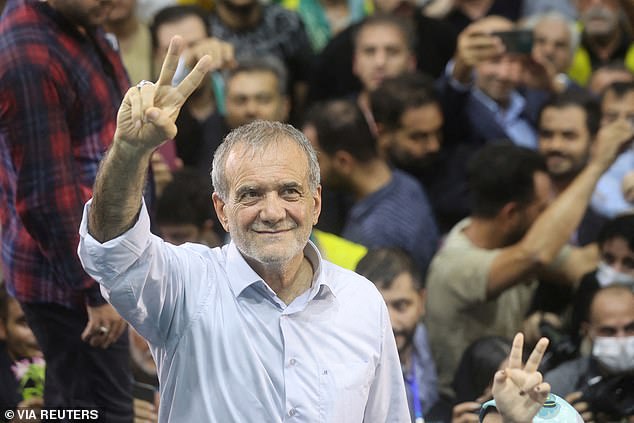The only moderate presidential candidate on the ballot in Iran has taken a surprising lead in opinion polls, putting him ahead of an anti-Western cleric in the country’s vote today.
Massoud Pezeshkian is a wild card in the race and has condemned violent attacks on women by the regime’s morality police, who enforce strict dress codes, calling them “immoral”.
The 69-year-old reformer said: “If wearing certain clothes is a sin, then behaviour towards women and girls is a hundred times more sinful. Nowhere in religion is it permissible to confront someone over their clothing.”
Despite being loyal to the country’s theocratic government, Pezeshkian has received a huge wave of support from voters desperate to spurn the regime of Supreme Leader Ayatollah Ali Khamenei.
Meanwhile, his hardline rivals Mohammad Baqer Qalibaf, a former commander of Iran’s Revolutionary Guard, and Saeed Jalili, a former hardline nuclear negotiator, trail behind, as Iranians bristle at the conservative ayatollah.
Massoud Pezeshkian is a wild card in the race and has condemned violent attacks on women by the regime’s moral police.
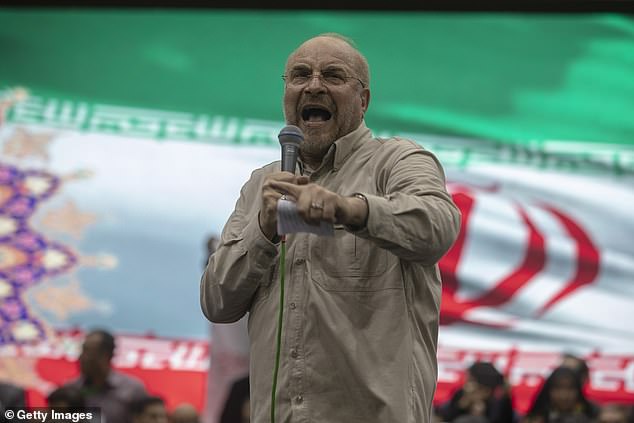
Mohammad Baqer Qalibaf, former commander of Iran’s Revolutionary Guard and anti-Western
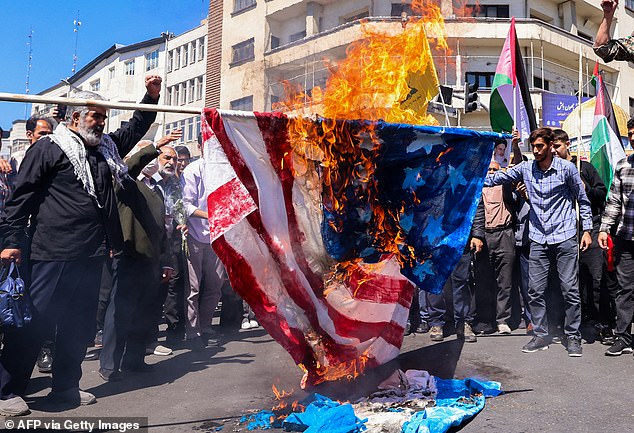
Protesters burn an American and an Israeli flag during the funeral of seven members of the Islamic Revolutionary Guard Corps killed in an attack in Syria.
The polls are now open in the race to replace the late Ebrahim Raisi, Iran’s hardline president who died in a helicopter crash on a foggy mountainside last month.
The popularity of Pezeshkian, a former heart surgeon considered free of corruption, has caused panic among hardliners.
In contrast to his hardline rivals, he advocates détente with the West, economic reform, social liberalisation and political pluralism.
According to the latest poll by Parliament’s research center, cited by news website Tasnim, Pezeshkian is projected to finish first with about 30 percent.
He suggested that hard-liner Jalili would come second with the backing of 18.8 percent of voters, ahead of Ghalibaf on 16.8 percent.
His chances depend on reviving the enthusiasm of reformist voters who have largely stayed away from the polls over the past four years after previous pragmatic presidents achieved little change.
He could also benefit from his rivals’ failure to consolidate the hardline vote.
An earlier poll conducted Wednesday by Iran’s government-funded ISPA put Pezeshkian ahead with 33.1 percent of the vote and Jalili and Ghalibaf with 28.8 and 19.1 percent respectively.
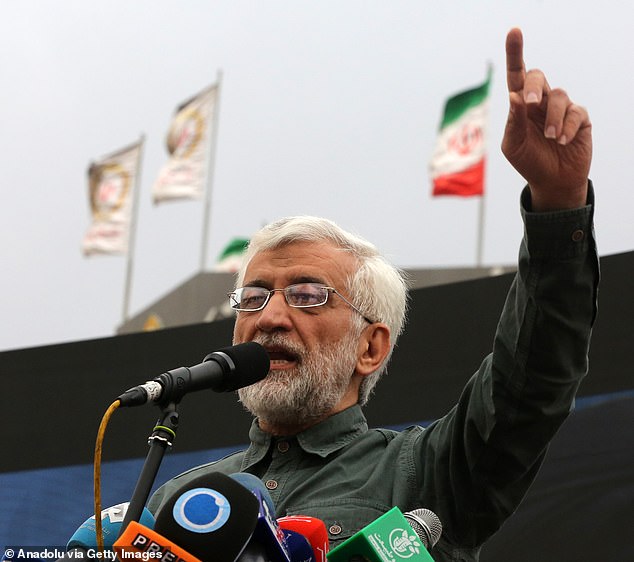
Saeed Jalili, one of the conservative candidates in Iran’s June 28 presidential election
There are concerns that the two hardliners could split the conservative vote, as two ultra-conservative candidates dropped out earlier this week to consolidate it.
Turnout is expected to hit a new low as the regime faces a wave of anger and disillusionment, with many saying they have no confidence in the diplomatic process.
This comes after huge protests erupted over the death of 22-year-old Mahsa Amini in the custody of the morality police in 2022, further widening the rift between Iran’s leaders and its people.
The hashtag #ElectionCircus has been widely posted on the social media platform
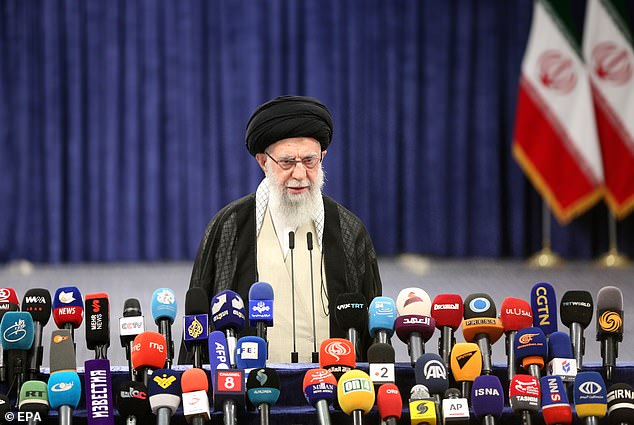
Iranian Supreme Leader Ayatollah Ali Khamenei speaks to the media after casting his vote during the presidential election in Tehran
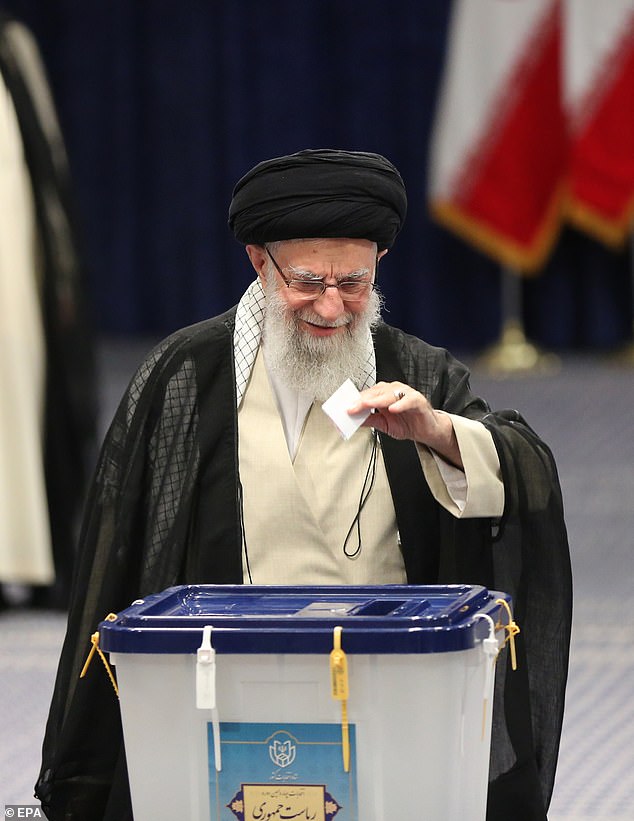
Iran’s Supreme Leader Ayatollah Ali Khamenei speaks to the media after casting his vote during the presidential election in Tehran
Observers have expressed concern that the election may have been rigged, saying Pezeshkian was only allowed on the ballot simply to “legitimize” the vote and boost turnout.
Iran’s supreme leader called on the public to vote in the early elections, saying in brief remarks: “I see no reason to hesitate.
Khamenei said high turnout was a “definite necessity” for the Islamic Republic. He also called the election an “important political test.”
Raisi, 63, had been considered a protégé of Khamenei and a possible successor to the post of Iran’s supreme leader, who has final say on all matters of state in the Shiite theocracy.

